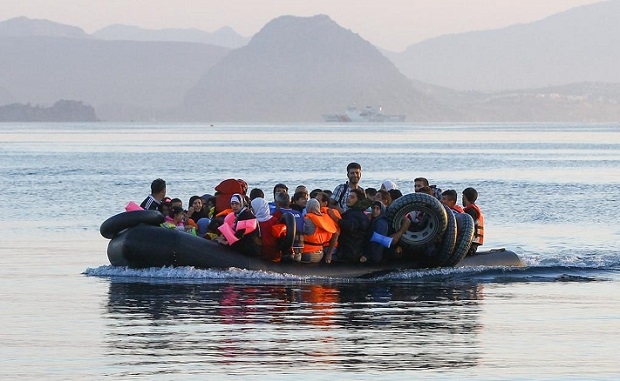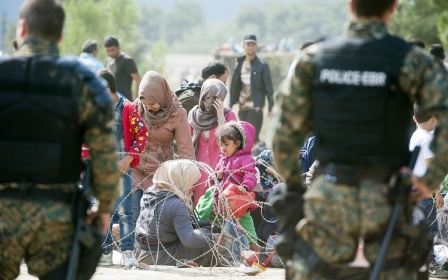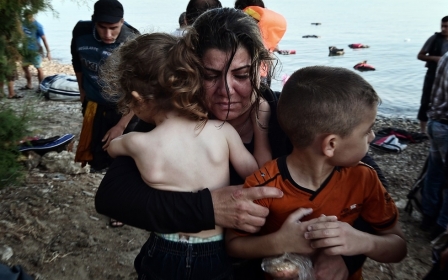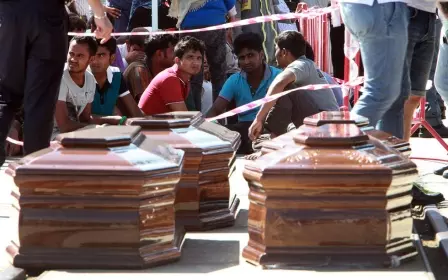ANALYSIS: Egypt cracks down on irregular migrants

ALEXANDRIA, Egypt - At this point, not much is known about Safa Ibrahim Hassan. There has been little about her in the news. Her grieving family has been released from detention without fanfare.
The eight-year-old Syrian girl became the latest casualty on Egypt’s coastline earlier this month after she was shot dead by border guards while trying to flee to Europe, according to local media and rights organisations in Alexandria.
Hassan was reported killed after border guards fired on a boat leaving the coast near Borg al-Burullus, in the Kafr al-Sheikh Governorate.
Local media, including Youm7 newspaper, reported that border guards fired on the boat, adding that an “exchange of fire” had taken place between the migrants’ boat and security forces.
None of the migrants detained from Hassan’s group were willing to be interviewed - although Muhammad Kashef, a documentation officer at the Egyptian Initiative for Personal Rights (EIPR) in Alexandria, spoke by telephone to eyewitnesses detained shortly after her death.
“The migrants say there was no exchange of fire,” he told Middle East Eye. “It was the coastguard that fired on them. There was a warning shot first, but the boat didn’t stop.”
Kashef says that the bullet that killed Hassan was then fired. She is thought to have died from a stomach wound.
Two Syrian men, named by Youm7 newspaper and Egypt24 website as 19-year-old Mohamed Ghayba Jamal and 30-year-old Mohamed Abu Hijra, were both wounded in the same incident.
Although more than a dozen border deaths have taken place on Egypt’s Mediterranean coast this year solely due to shipwrecks and boats capsizing, this is not the first time Egyptian security forces have killed irregular migrants attempting to reach Europe.
Last year, a Syrian man named Oraby Mahmoud Abd El Qader was reportedly shot dead on a beach near Abu Qir after he, his family and dozens of other refugees attempted to board a boat. The trip was disrupted on the beach and, while in the custody of the military, Abd El Qader was shot in the back of the neck - seemingly by accident. The same bullet injured a Palestinian man, who was later deported to the Gaza Strip.
Amnesty International documented another incident the year before, on 17 September 2013. Fadwa Taha, a 50-year-old Palestinian refugee from Syria, and 30-year-old Syrian refugee Amr Dialool, both died when the Egyptian coastguard fired on a boat sailing away from the coast.
According to eyewitnesses interviewed by Amnesty International at the time, security forces fired “several shots into the hull of the boat,” despite protests by migrants that there were children on board. Amnesty noted how the shots fired “narrowly missed children”.
No individual has been held accountable for any of these deaths, according to lawyers and civil society organisations in Alexandria.
However, amid unprecedented threats in the Western Desert and North Sinai, Egypt appears increasingly concerned about border security.
In recent months, Egyptian naval vessels have encountered two significant attacks at sea by militants thought to be from the Islamic State-affiliated Sinai Province, formerly known as Ansar Bayt al-Maqdis.
In mid-July, Sinai Province militants claimed a “guided missile” attack on an Egyptian navy ship in the Mediterranean, off the coast of North Sinai. The Egyptian army disputed claims that the ship was destroyed and all of its crew killed.
Last November, militants also hit a navy vessel off Damietta, a port city on the eastern edge of the Nile Delta, which has in the past served as a launchpad for irregular migrants headed for Europe.
Possibly as a result of heightened security in the area following November’s attack, or a coincidental shift in smuggling routes towards the more central Delta governorate of Kafr al-Sheikh, irregular migration has as good as stopped around Damietta. Migrant detentions have not exceeded 100 for the whole year, almost half the number compared with last year. Kashef puts it down to “more control by the navy and coastguard”.
The picture elsewhere, though, could not be more different. Several hundred migrants are arrested each month along Egypt’s north coast between Marsa Matrouh and the Nile Delta. According to figures from the UN refugee agency (UNHCR) and the Mixed Migration Hub, a Cairo-based network of agencies that documents irregular migration around the Mediterranean, more than 700 people were detained on the north coast in June, and 350 in July. Organisations in Alexandria are bracing for a major wave of departures in September.
Foreign embassy staff in Alexandria and Cairo, speaking on the condition of anonymity, have suggested that recent efforts by the Egyptian government to manage irregular migration are based on the concern that it reveals a key weakness. A boat carrying irregular migrants undetected across Egypt’s borders could just as well be a boat carrying armed militants.
Zack Gold, a visiting fellow at the Institute for National Security Studies in Tel Aviv, said that Egypt’s north coast - used by “smugglers, IS-linked militants and irregular migrants” - is just one border threat Egypt is facing. And while the western border might be a priority for the government and the security apparatus, “irregular migration does reveal gaps in border security.”
Therefore it is problematic. “But,” Gold added, “if it can be tracked, it also allows Egypt to plug that gap before it is exploited by violent actors”.
“The more Egyptian forces are operating in border areas, the more difficult irregular migration becomes,” Gold said. “For example, the US Trafficking in Persons Report notes Egyptian military operations in North Sinai have basically stopped trafficking to the peninsula even though the targets of those operations are militants, not traffickers.”
“As Egypt adds more advanced border security technology to its arsenal, the fewer gaps there are for irregular migrants to exploit.”
Last week, a military source appeared in Youm7 newspaper talking up the skills and professionalism of Egypt’s border forces, having announced that the military had detained 5,087 people for irregular migration in the past month.
“Border guards are intensifying their efforts on different strategic routes, especially the western and southern ones, to combat any attempts of infiltration and smuggling,” the source was quoted as saying, adding that border forces are now equipped with “modern weapons and techniques” allowing them to better control Egypt's borders.
Border forces have been acquiring new equipment and training, both to protect Egypt from the increasingly real threat posed by adaptable, well-equipped militant groups like Sinai Province; but also to monitor, limit and effectively stop cross-border irregular migration.
The Washington Post also reported in early July that the US State Department had entered an agreement to sell high-tech border surveillance equipment, worth $100 million, to the Egyptian government - equipment that would “provide Egypt with advanced capabilities intended to bolster its border surveillance capabilities along its border with Libya and elsewhere,” according to a Pentagon statement. The deal, if approved by Congress, would send mobile surveillance towers and communications equipment to Egypt’s border forces, as well as defence contractors to train them.
Following two inquiries since November last year by the parliamentary group of Germany’s Left Party in the Bundestag, it was revealed that the German government has been in talks with Cairo regarding training border guards to tackle migration. The assistance would include a training course, delivered by German police personnel in Germany, on “border control and repatriations”.
The European Commission has also earmarked Egypt as a vital country of transit in Mediterranean smuggling routes, and one whose government can be worked with - through cooperation deals and existing regional frameworks like the Khartoum Process - to limit irregular migration.
Increased detention, border control, smuggling routes impacted by Egypt’s counter-terrorism policy - irregular migrants hoping to reach Europe from Egypt’s coastline could now have many more challenges standing in their way. Drowning is just one of them.
New MEE newsletter: Jerusalem Dispatch
Sign up to get the latest insights and analysis on Israel-Palestine, alongside Turkey Unpacked and other MEE newsletters
Middle East Eye delivers independent and unrivalled coverage and analysis of the Middle East, North Africa and beyond. To learn more about republishing this content and the associated fees, please fill out this form. More about MEE can be found here.




